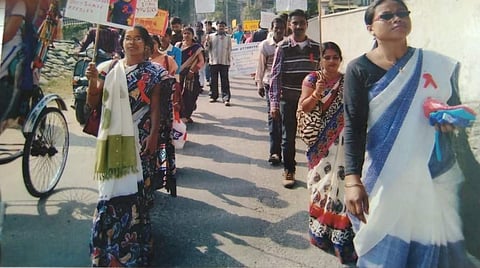

Monoprava Adhikari was quivering in her bed all night with what she thought was food poisoning. She decided to consult a doctor after one too many trips to the bathroom through the night. With her husband by her side, she took a one-hour trip to the district hospital in Jalpaiguri the very next morning. The doctor examined her and had some peculiar questions for her.
"Does your husband stay abroad?" asked the doctor. Monoprava nodded in agreement. "Then you should get these tests done." Monoprava complied. But there was something odd in her husband's behaviour. It seemed as if he had no interest whatsoever in the whole thing. He came home late with the report the next day. Monoprava opened the report.
It read 'HIV positive'.
He sat on her bedside and broke down in tears, "I am positive too. I have been taking medication for the past five years. But I did not have the courage to tell you. I was ashamed."
A lot has happened since that fateful day in 2012. Her husband passed away a few years later. Her 19-year-old daughter is pursuing her graduation in bio-science and her son (21), works for a local data entry unit. "He passed away because of his own fault. He didn't adhere to the most important thing, the doctor's instructions. But he has taught me the most important lessons of my life," Monoprava pauses for a moment. "His life is the perfect example of what a positive person should never do."
Monoprava toils day and night to help other positive individuals lead a normal life and she has no issues divulging the fact that she is HIV positive, "If I am ashamed to reveal what I have, how do I expect them to understand that it is nothing to be ashamed of. I need them to see that I am carrying the same virus in my blood and I am leading an active life," she says.
When she discovered that she was positive the first thing that struck her was that she had to take care of her children.
Monoprava started off with at clerical post, keeping a track of the people who have been recognised as positive by the ground level workers of an HIV eradication programme and is currently working with inmates from 13 jails across five districts in West Bengal, in collaboration with SAATHI.
Being shy about your disease is the worst thing you can do to yourself. Not only will it give you the inferiority complex that you do not deserve, but it can also cause physical harm at times. "My husband never told anyone that he was positive. Not even if he was visiting a doctor. The first thing a positive individual should tell the doctor is about the virus. Only then will the doctor be able to commence the treatment. It would have been so much easier for him if I knew from the beginning," says Monoprava. "By keeping it from your spouse you are only exposing him or her to the risk more. People should also be talking about sex and even same-gender sex more openly. The inmates I am working with now are not even aware of the word and maybe because of that their questions are not prejudiced that much."
Monoprava has transformed from a housewife from a remote village in Jalpaiguri district to the hope of thousands of people who look up to her as their beacon of hope. "But we need more people working on the ground. The networks and NGOs that were previously there are not so much active any more. All the positive individuals used to assemble regularly and talk. The NGOs provided the platform for that. They also helped track down those who had discontinued treatment or were not attending meeting. The government gave us funds for that. I have spoken to the district's medical officer but he couldn't help either. We have written to the ministry as well but no one bothered to reply. If we can get the bare minimum of even a few thousand rupees we can continue the meetings," says Monoprava.
